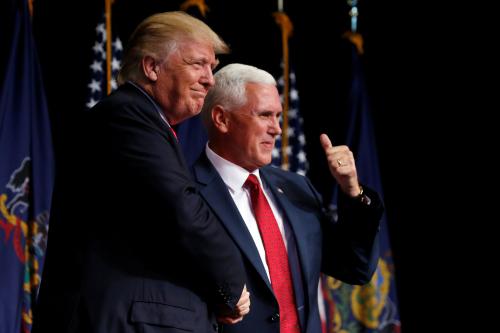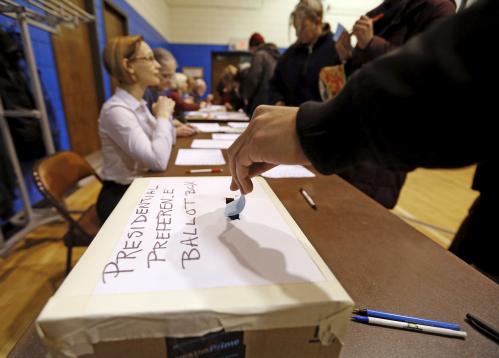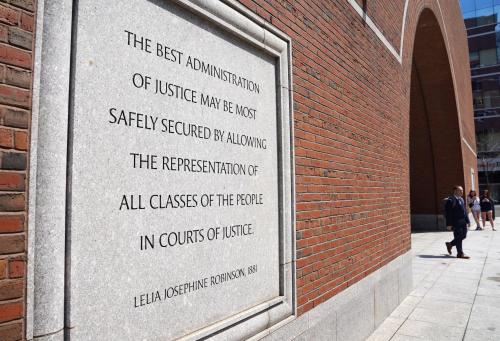Back in August when Donald Trump was having a very, very bad week people started to wonder if things would get so bad that he would drop out of the race. Now, in September, Hillary Clinton’s health problems have put that thought in more than one person’s head. Of course this is all hyperventilating. A bad week didn’t drive Trump out of the race any more than a case of pneumonia will drive Hillary out of the race. But the mere speculation, the “what if,” opens up a window on a part of the presidential election process that no one seems to understand:
The electoral college.
It is enshrined in Article II of the Constitution and consists of 538 real live people. This comes as a surprise to most Americans who see the electoral votes won on election night but who don’t realize (unless they read the fine print in the polling place) that they are not actually voting for the presidential candidate, they are voting for electors pledged to that candidate. The actual electors meet after the November election, usually in obscurity in their state capitol, sign the affidavit casting their votes, send it to the United States Senate, have lunch and go home. Each state has their own traditions to mark the occasion. Have a look at this exciting video of elector meeting in 2012 in Rhode Island:
But the presidential election results aren’t valid until they actually sign their names to the document that is sent to the Senate. What if an elector doesn’t sign his or her name for the candidate they were expected to support? Most states have laws binding their electors but some twenty-one states do not. Or what if the election doesn’t go smoothly? What if the presidential candidate dies between election day and inauguration day? What if there’s a tie? These sorts of scenarios turn the boring business of the electoral college into high drama.
“If, at the time fixed for the beginning of the term of the President, the President elect shall have died, the Vice President elect shall become President…” U.S. Constitution, Article II, Twentieth Amendment
The first one, The People’s Choice, was written by Jeff Greenfield in 1995. Greenfield is a veteran political reporter who has covered presidential politics for CBS, CNN and ABC and written many books and articles on politics. The second one, The Electors, was written by Roy Neel in 2015. Neel is a long-time political operative from Tennessee who followed Senator and later Vice President Al Gore to the White House and through the famous 2000 election. Both authors know their history and politics, and weave stories that illustrate just how strange a presidential election can get. If you are already tired of watching the campaign but still hooked on politics I recommend two novels that deliver on drama in the electoral college. Although these are works of fiction they were written by people with deep political knowledge and as they unfold they tell us a great deal about this archaic institution by posing two scenarios that people start to wonder about when the race is close: what if electors take control of the election result, and what if someone takes control of the electors?
What if THE electors took charge?
In The People’s Choice, Macarthur “Mack” Foyle is elected president of the United States in a close election. As one of his first, triumphant post-election photo-ops the president-elect agrees to go to Wyoming, dress up like a cowboy and ride a horse through town—a gesture of gratitude to the western voters who helped elect him. Of course there are two little problems with the perfect photo-op: first, Foyle loathes horses so much that he admires the French for eating them. Second, the campaign enlists a picture-perfect horse handler, Old Doc Falter, who makes a crucial mistake.
When he reaches for a pre-loaded syringe of Nembutal, a depressant—his method for calming the horse and guaranteeing the safety of the horse-hating rider—he pulls out a syringe of adrenaline instead.
Needless to say, the ride doesn’t go as planned. Then, as the president-elect lays injured in the hospital, a “sudden, undetected embolism in the left lung” kills him. This happens on page 53 and for the next 250 or so pages a funny but plausible drama unfolds. In the weeks between the death of the president-elect and the meeting of the electoral college, the electors themselves, their very existence unknown to the country, begin to assert their constitutional authority. From Dorothy “Dot” Ledger, a loyal party workhorse from Michigan, comes the almost unthinkable question “Suppose I don’t want to vote for Block for President? Suppose I think it would be the wrong thing to do?” And she wasn’t the only elector asking that same question. Although it doesn’t seem to be spreading, we have seen electors threaten to go rogue this year. In a recent Roll Call column, political journalist Walter Shapiro speculates that in a close race, electors could move the contest to the House and elect Paul Ryan president.
But back to fiction. In Greenfield’s story, the Republican National Committee meets, fills the vacancy with the vice president-elect and goes home assuming that there will be a Republican president. But the new president-elect, Theodore Block, is a dimwitted rich boy whose nomination had been fiercely opposed by the dead president-elect’s most loyal supporters. (Think the worst possible caricatures of Dan Quayle and Sarah Palin rolled into one and magnified and you get the vice presidential candidate Greenfield created.)
In reality, electors are selected to be party loyalists. Slates of electors are chosen by the party in their state. The criteria are loyalty and service to the party, since their most important job is to cast their votes for the presidential candidate who won their state. For instance, on August 16, 2016, the Massachusetts Democratic State Committee elected eleven people as electors and two alternates. To a person they are party stalwarts, known to those of us who elected them (I’m a member of the Massachusetts Democratic State Committee) as solid, good Democrats. And although Massachusetts’ electoral votes haven’t gone to the Republican side since 1984, Republicans too will have electors ready to cast their votes at the statehouse if their candidate wins.
This isn’t to say that electors have always followed the party line. There have been 157 faithless electors in history, but their effect has been limited—in half of those cases, the candidate they chose not to support was already dead. No more than one elector at a time has changed their vote in any given election since 1948.
What if someone tried to corrupt THE electors?
In The Electors, the presidential campaign is interrupted by the explosion of a “dirty bomb,” a small nuclear device, in the nation’s capital. The incumbent president, Grady Holland, expects to sail into a second term by offering continuity and stability in the government. But it doesn’t work. When election day rolls around, Holland is defeated by his opponent Calvin Bridges (a Democrat) but the electoral college vote is close, with Holland at 267 and Bridges at 271. Holland is only three votes away from holding onto his job, a fact recognized by a wily and unscrupulous political operative named Eldon Mann. Mann leads an operation to steal the presidency back by manipulating the electoral college.
“Each presidential elector shall vote for the presidential candidate and, by separate ballot, vice-presidential candidate who received the highest number of votes at the preceding general election in this state.” State of Colorado § 1-4-304
He sets up in Leesburg, Virginia, far enough away from the capital that no one will stumble upon it and ask questions, but close enough to drive to. The team consists of dozens of investigators who begin the process of sifting through the backgrounds of every single Democratic Elector who is not bound by state law to vote for the winner of their state. Using sophisticated hacking technology that didn’t even exist when Greenfield wrote his novel, (in fact the Internet barely existed in 1995) the fictitious Eldon Mann and his team of investigators begin a hunt for the vulnerabilities in every single elector who might be convinced to change their vote from Bridges to Holland and whose state law does not bind them to vote for the winner of the state. They find what they need. Vulnerable people like the female elector from New Hampshire with health problems and a desperate need for money to be used for medical treatments that will save her daughter’s life. Bribery, blackmail—it’s all on the table in order to convince three electors to switch loyalties and vote for the incumbent president.
A mad dash to influence electors between the election and their statehouse meetings would only work in states that don’t have laws governing electoral votes.
Both novels are exciting and somewhat terrifying as they bring home to us how, under the right set of circumstances, the electoral college could actually work. Let’s hope they remain, however, the stuff of fiction. So far this election season has been filled with the unexpected – we don’t need any more.
Elaine C. Kamarck is a Senior Fellow at the Brookings Institution and author of Primary Politics: Everything You Need to Know about How America Nominates Its Presidential Candidates. She is a superdelegate to the Democratic convention.
The Brookings Institution is committed to quality, independence, and impact.
We are supported by a diverse array of funders. In line with our values and policies, each Brookings publication represents the sole views of its author(s).







Commentary
The electoral college is the answer to many of this election’s “What if?” questions
September 19, 2016